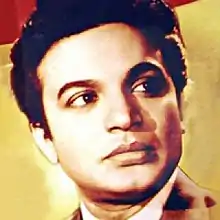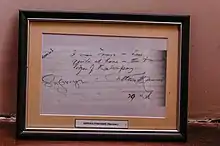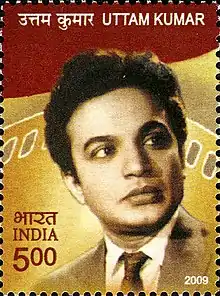Uttam Kumar
Uttam Kumar (born Arun Kumar Chatterjee; 3 September 1926 – 24 July 1980), popularly known as the Mahanayak[1] was an Indian film actor who predominantly worked in Bengali cinema.[2][3]
Uttam Kumar | |
|---|---|
 | |
| Born | Arun Kumar Chatterjee 3 September 1926 |
| Died | 24 July 1980 (aged 53) |
| Other names | Mahanayak |
| Occupation | Actor, producer, theatre director |
| Years active | 1948–1980 |
Works | Filmography |
| Spouse(s) | Gauri Chatterjee
(m. 1941–1980) |
| Children | 1 |
| Relatives |
|
| Awards | Full list |
Career
Kumar's career starts with the 1948 film Drishtidan. One of his lauded appearance was in Satyajit Ray's Nayak (1966). It is now widely accepted that Ray wrote the script with Uttam in mind. Many people feel the film bears resemblance to Uttam Kumar's own life – the sense of anxiety and restlessness mirrored Uttam's insecurities about his phenomenal success and abiding fear that his superstardom might not last. Uttam made the role of Arindam (Mukherjee) his own and Ray later confessed that if Uttam had refused the film, he would have abandoned it. He worked with Ray the following year in Chiriyakhana (1967).[4]
.png.webp)
He explored new avenues of film-making by trying his hand at production, singing, composing music, screenplay writing and directing. The success of his Indian films as producer — Harano Sur, Saptapadi, Bhrantibilash, Jotugriha (1964), Grihadah — won greatest acclaim. On producing Chhoti Si Mulaqat in 1967, which was a Hindi film starring Uttam and Vyjayanthimala, Uttam almost used up all his savings, since the film had to be shot in colour and was shot in extravagant locations. Both Uttam and Vyjayanthimala had huge hopes associated with the film, but the film was a flop leading to great disappointment for Uttam Kumar. It was later said that this flop was one of the main reasons for triggering the heart attack, which ultimately led to his death.[5] Later, Uttam directed much-lauded films such as Sudhu Ekti Bochhor and Bon Palashir Padaboli. He composed music for the film Kaal Tumi Aleya in which Hemanta Mukherjee and Asha Bhosle sang to his tune.
He came out with an authorised biography Aamar Ami in 1979–80. He had a phenomenal fan base which continues even to this day. In 1960, he started writing an autobiography named Harano Dinguli Mor (My Bygone Days), but could not complete it. Parts of that book were published by the magazine Nabokallol. On the day Uttam died, the original manuscript was stolen. Later, a member from Times of India had found the manuscript and the national library helped to find old editions of Nabakallol and then the incomplete book was finally published in the 37th Calcutta Book Fair. As a singer, he recorded songs for the AIR – All India Radio – and very recently, an album of Tagore songs (Rabindrasangeet) sung by him, has been brought out.[6]
There was a time, when at the heights of his popularity Uttam Kumar was approached to recite the Chandi Path in the All India Radio (AIR) studios. Traditionally this had always been done by Birendra Krishna Bhadra. But there was a huge uproar amongst the audience as to why Uttam Kumar had been chosen instead of Birendra Krishna. Uttam personally met Mr. Bhadra and apologised and from the next year Mahalaya on AIR was again done by Bhadra.[7]
Reruns of his films on television decades after his death are still eagerly watched. Uttam Kumar's time is considered by most as the Golden Era of Bengali cinema.[8]
Uttam-Suchitra combination

The on-screen chemistry between Uttam Kumar and Suchitra Sen has always been much adored and admired. Both of them together constituted the evergreen and popular romantic pair of Bengali Cinema till date. Some of Uttam's famous films co-starring Suchitra Sen include Share Chuattor, Agni Pariksha, Shilpi, Saptapadi,[9][10] Pathe Holo Deri, Harano Sur, Chaowa Paowa, Bipasha, Jiban Trishna, Sagarika, Trijama, Indrani, Sabar Upare, Surjyo Toron, Rajlakshmi O Sreekanto, "Ekti Raat", "Grihadaha", Kamallata, Har Mana Har, Alo Amar Alo.[11][12]
Shonar Harin (1959) saw Supriya Devi (who would win great accolades for her performance in Ritwik Ghatak's Meghe Dhaka Tara the following year) play the lead opposite Uttam Kumar. As they began to act in more films together, the two got involved off-screen as well. In 1963, Uttam left his family home at Girish Mukherjee Road, Bhowanipur and stayed with Supriya for the next 17 years till his death. They starred together in several other films like Uttarayan, Chiradiner, Agni Sanskar, Suno Baranari, Kal Tumi Aleya, Lal Pathor, Andha Atit, Sudhu Ekti Bochhor, Mon Niye, Bilambita Loy, Bhola Maira, Sanyasi Raja, Bon Palashir Padabali, Sister, Jibon Mrityue, Bagh Bandir Khela.[13]
Personal life

Uttam Kumar married Gauri Chatterjee in 1941. Later, he lived with actress Supriya Devi when he left his home at Girish Mukherjee road in 1963 till his death.[14]
Death
A workaholic, he was rumoured to have said that his preferred demise would be on the floor of a studio, doing what he loved best: acting. While filming Ogo Bodhu Shundori in 1980 Uttam Kumar suffered a stroke and was admitted to the Belle vue Clinic. The doctors did their best for 16 hours but he died that night on 24 July 1980 at the age of 53.[15][16]
Filmography
Accolades
- 1955: Recognition from the Government of India for Harano Sur.
- 1961: 9th National Film Awards – Certificate of Merit for Second Best Feature Film in Bengali – Saptapadi[17]
- 1963: 11th National Film Awards – National Film Award for Best Feature Film in Bengali:Uttar Falguni (as producer)[18]
- 1968: National Film Award for Best Actor for Chiriyakhana and Antony Firingee in 15th National Film Award (he was the first actor to get that. The very same year when actress Nargis got best actress award for Raat Aur Din)
- 1962: B.F.J.A Best Actor award for Saptapadi. Uttam Kumar received the award from the legendary film-maker Debaki Bose.
- 1967: B.F.J.A Best Actor award for Nayak. Attended the Berlin Film Festival as a distinguished guest.
- 1968: B.F.J.A Best Actor award for Grihadaha.
- 1972: B.F.J.A Best Actor award for Ekhane Pinjar.
- 1973: B.F.J.A Best Actor award for Stree.
- 1975: B.F.J.A Best Actor award for Amanush.
Legacy

Tollygunge Metro station in Kolkata was renamed as Mahanayak Uttam Kumar Metro Station in his honour. There is a theatre (Uttam Mancha) named after him in Kolkata. A life-size statue has been erected near Tollygunge metro station which has recently been renamed after the iconic actor by the Central Railway Ministry.[19] Besides, Shilpi Sansad, the actor's pet project of safegurading the artists especially the poor and the old, is active still. Celebrating the 89th birth anniversary of Uttam Kumar, the Department of Posts in 2009, released a series of new postal stamps featuring the actor on them.The Department of Posts also released a brochure on the Uttam Kumar Stamp release with a note that says "Uttam Kumar – The Legend of Indian Cinema". The Government of India on 19 June 2015, released the "UTTAM" Award for Best acting. In the year of 2016, a television series called "Mahanayak" was telecast. It was based on his life.[20]
- "It is the demise of a leading light of the Bengali film industry...There isn't – there won't be another hero like him."[21]
- "Uttam Kumar was the most gifted actor I ever worked with. His first Hindi film, Chhoti Si Mulaqat, was opposite me in 1967... Uttam Kumar was thoroughly professional, cooperative and lip-synced perfectly, especially on "Aye Chand" and "Tujhe Dekha". He lip-synched songs rendered by Hemant Kumar, Manna Dey and Mohammed Rafi as if he was singing them. I was criticised for Chhoti Si Mulaqat but Uttam Kumar never criticised me"[22]
- "If Uttam Kumar committed a crime and then he gave that smile, I was ready to believe he was innocent."[23]
References
- Pothukuchi, Madhavi (24 July 2019). "Uttam Kumar — the 'mahanayak' who defined Bengali cinema for three decades". ThePrint. Retrieved 26 January 2021.
- "Of fond memories", The Telegraph, 24 July 2003, archived from the original on 29 June 2012, retrieved 15 August 2010
- Dasgupta, Priyanka (24 July 2010), "Star struck for Uttam?", The Times of India, archived from the original on 11 August 2011, retrieved 15 August 2010
- "Byomkesh Bakshi". The Telegraph. 7 August 2010. Archived from the original on 23 August 2010. Retrieved 15 August 2010.
- "Uttam Kumar: As a Producer". gomolo. 13 June 2008. Archived from the original on 23 September 2011. Retrieved 4 September 2011.
- Nag, Kushali (20 July 2008). "Living with Uttam Kumar". The Telegraph. Archived from the original on 1 August 2008. Retrieved 15 August 2010.
- "Reference: Two Legends and Their Lives: Uttam Kumar Suchitra Sen". Learning and Creativity. 13 September 2012. Archived from the original on 27 January 2014. Retrieved 27 January 2014.
- "Beyond the Enigma: Uttam Kumar, the Man and the Mahanayak". The Quint. 3 September 2017. Archived from the original on 30 March 2018. Retrieved 29 March 2018.
- Das, Mohua (9 December 2009). "how Saptapadi shattered stereotypes". The Telegraph. Archived from the original on 13 February 2010. Retrieved 15 August 2010.
- Nag, Kushali; Chattopadhyaya, Sanjoy (16 December 2008). "Saptapadi bike still road-worthy". The Telegraph. Archived from the original on 25 October 2012. Retrieved 15 August 2010.
- "When the Bhadralok opens his doors to the others". The Telegraph. 27 August 2009. Archived from the original on 25 October 2012. Retrieved 15 August 2010.
- "Forever Suchitra". The Telegraph. 21 March 2010. Archived from the original on 25 May 2010. Retrieved 15 August 2010.
- Is, India (10 January 2008), "Live-in genes", The Telegraph, archived from the original on 25 October 2012, retrieved 15 August 2010
- "Actor Supriya Devi's legacy was more than just being Uttam Kumar's heroine". dailyo.in. 26 January 2018. Archived from the original on 30 March 2018. Retrieved 29 March 2018.
- He was the greatest actor in the Indian film. "July '80", The Telegraph, 20 July 2010, archived from the original on 28 March 2010, retrieved 15 August 2010
- "Fadeout of Uttam films", The Telegraph, 24 July 2005, archived from the original on 4 March 2016, retrieved 15 August 2010
- "9th National Film Awards". International Film Festival of India. Archived from the original on 2 December 2016. Retrieved 8 September 2011.
- "11th National Film Awards". International Film Festival of India. Archived from the original on 2 May 2017.
- Banerjee, Sudeshna (25 July 2010), "Mamata's day out", The Telegraph, archived from the original on 28 July 2010, retrieved 15 August 2010
- "stamps 2009", India Post, archived from the original on 28 September 2014, retrieved 15 August 2010
- "Uttam Kumar(3 September 1926 ) was a legendary Bengali actor" (PDF). mahanayak.com. Archived from the original (PDF) on 26 November 2013. Retrieved 18 November 2012.
- Ranjan Das Gupta (23 July 2010). "Remembering the matinee monarch". The Statesman. Archived from the original on 14 September 2012. Retrieved 4 January 2012.
- "Soumitra Chatterjee is bigger than a Ray actor". www.rediff.com. Archived from the original on 30 June 2018. Retrieved 30 June 2018.
- "After station, it's a stamp in Uttam Kumar's name". The Times of India. Retrieved 18 November 2012.
- "Postage Stamp". 3 September 2009. Archived from the original on 29 August 2017. Retrieved 29 August 2017.
- "Uttam Kumar in Postage Stamp". Archived from the original on 5 February 2017. Retrieved 31 December 2019.
External links
| Wikimedia Commons has media related to Uttam Kumar. |